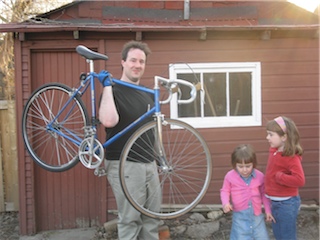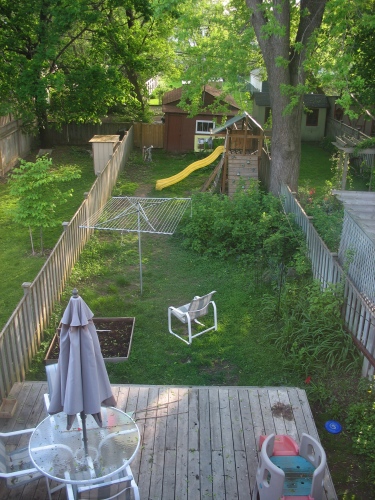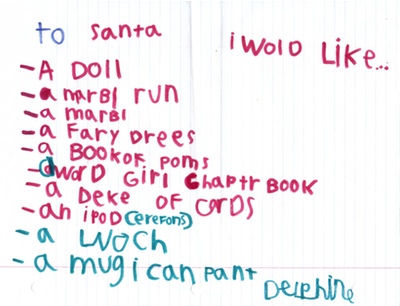Books Read in Novemberish Decemberish
A while ago I read the latest Kathy Reichs: 206 Bones. You know, if it were up to me, I wouldn't bother with Kathy Reichs. I really only read them because my mother reads them and it's nice to talk about them with her. Anyway, I guess I must like them well enough because I do read them. In this one our feisty heroine finds herself trapped in a tomb, struggling to remember how she got there and find out how to get out before it's too late! The mystery was mysterious and satisfyingly resolved, but my very favourite part of the book was right at the end, when Reichs let her character, Tempe Brennan, stop talking in sentence fragments for a heartfelt paragraph about the field of forensic anthropology. It was clear that it was Kathy Reichs talking, not Tempe Brennan, and equally clear to me that I would rather read a book about Reichs than about Brennan.
A Handful of Time by Kit Pearson. Twelve year old Patricia is sent from her home in Toronto to stay with her aunt and cousins— strangers to her—at their lakefront cottage in Alberta, while her parents sort out the terms of their divorce. Unable to get along with her cousins, she explores on her own and finds a pocket watch which takes her back in time to when her own mother spent her twelfth summer at the lake. Patricia divides her summer between her mother's childhood and her own, and discovers how to connect with her cousins and with her present-day mother. A Handful of Time is a beautifully written book with believeable, rich characters and a satisfying ending. Also, it made me cry. A keeper for the girls' bookshelf.
The Drunkard's Walk: How Randomness Rules Our Lives by Leonard Mlodinov is a stats book. I love stats—I really should have done stats at school, if any math—but it's hard. The human brain is not wired to understand risk and probability. The good news is Leonard Mlodinov makes it much easier to understand. This book goes over a lot of the basic principals of probability: sample space, the law of large numbers, bell curves, standard deviation, chi-squared. All that is the build up for what this book is about, which is how much more stuff is random than we think. Humans love to tell stories about the world, and when something apparently significant happens we would rather construct a narrative about why, than recognize that whatever it was was probably statistically inevitable, or at least not caused by whatever we're attributing it to.
This was one of the books I bought myself for my birthday, and I'm really happy to own it because it provides such good explanations for so many stats concepts, and despite being fascinated by statistics, I need to constantly refresh my understanding of it. Having this book on my shelf will make that a much less painful experience.
Speaking of bookshelves, my to-be-read shelf is two feet long and I committed to reading most of it before attacking my to-be-read list at the library, which is 50 books long (the maximum you're allowed to place on hold) or my to-be-read list on my computer, which is fifteen books long. (It would be longer, but I deleted it by accident a couple of weeks ago.)
As I say, I committed to reading most of the books on my physical bookshelf, but then I realized I'm not all that interested in reading a lot of them. Most of them are books that other people have given me to read, and I'm not excited about them at all, not in the way I'm excited about the books on my lists. I've got a dozen or more not-exciting books between me and the exciting books I want to read: that's not right. I've decided I'm going to sit down with all those books and reevaluate them. The ones I'm not interested in I will pass on, with no guilt. Life is too short to read books I'm not excited about.
How do other people manage their to-read lists?


 Also in April, Blake finally got around to converting the $200 Bianchi
he got at a garage sale for $30 to a fixie. Translations: a Bianchi is
an Italian make of bicycle; a fixie is a bike with no gears—the
pedals are attached directly to the rear wheel by the chain, so if
you pedal faster the wheels go faster, if you stop pedalling the wheels
stop (eventually) and if you pedal backwards the wheels go backwards.
This style of bike is much beloved of bike couriers and other people who
like a lot of control over their bike.
Also in April, Blake finally got around to converting the $200 Bianchi
he got at a garage sale for $30 to a fixie. Translations: a Bianchi is
an Italian make of bicycle; a fixie is a bike with no gears—the
pedals are attached directly to the rear wheel by the chain, so if
you pedal faster the wheels go faster, if you stop pedalling the wheels
stop (eventually) and if you pedal backwards the wheels go backwards.
This style of bike is much beloved of bike couriers and other people who
like a lot of control over their bike.




